The average cost of Laryngectomy in United Arab Emirates starts from AED 34865 (USD 9500)
Laryngectomy is a surgical process which is used to eliminate the larynx either entirely or a portion of it. The surgery is conducted to help the patient get rid of cancer but it can result in the loss of voice and change in the breathing pattern. While the procedure is conducted either entire or a part of the larynx is removed which also involves the removal of the thyroid gland, some lymph nodes and other glands. The elimination of the other organs is done depending on the medical history of the patient. When the larynx is eliminated entirely then a patient has to breathe using his stoma. Previously the patient breathed through the nose and the mouth but after the surgery, the nose loses the sensation of smelling and also loses his ability to converse like before. Voice restoration surgery can also be performed after the removal of the larynx. The surgery is meant for people who are suffering from laryngeal cancer and throat cancer. General anaesthesia is used during the surgical procedure. The surgical procedure takes up to 5 to 12 hours.
Laryngectomy in the United Arab Emirates is conducted in specialized hospitals and the medical professionals are extensively trained before they are allowed to proceed with the surgery. UAE is becoming one of the leading medical tourism destinations as people from all across the globe prefer this destination far more than the European nations. This is because the European nations charge their patients a hefty amount for treatment.
Laryngectomy cost in Dubai starts from USD 15600. The cost of the surgery in UAE depends on a number of factors like medical history, qualifications of the doctor, kind of hospital opted for, and much more.
Treatment cost
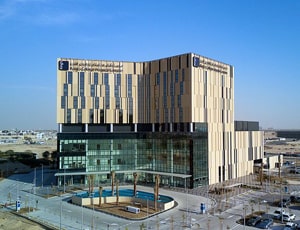
Apart from in-detail treatment procedures available, Kings College Hospital Dubai located in Dubai, United Arab Emirates has a wide variety of facilities available for International Patients. Some of the facilities which are provided by them are Accommodation, Airport Transfer, Choice of Meals, Interpreter, SIM, TV inside room. Also listed below are some of the most prominent infrastructural details:
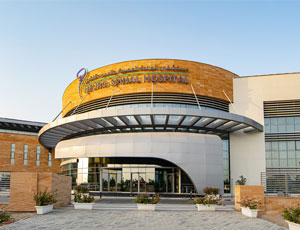
The Neuro Spinal Hospital is located in Dubai Science Park in Dubai. It is a pioneer in bringing the latest Technology, Medicine, and Education to heal and serve the community. It has been approved and accredited by the Dubai Health Authority and has the Government of Dubai and Dubai Health Experience as its partners.
It has a 114-bed capacity, green spaces for the rehabilitation of the patients, and smart patient rooms, and is four times that of its former premises in terms of capacity. It is also the first hospital to have surgical robots in UAE. The Continous Medical Education (CME) program was introduced in 2007 by the hospital that has become a mandatory requirement for all healthcare professionals. Practitioners need to provide that they have attended enough CME hours to be promoted to a higher level or renew their licenses.
The hospital consists of multinational staff who are dedicated to working together for solving problems with the patients and their families, to provide the highest level of support and care through advanced and progressive technologies, and an evidence approach to medicine, all delivered in a collaborative and compassionate environment. The team believes in safety, quality, dignity, engagement, and collaboration in providing premium healthcare to the patient. It consists of specialized units such as spinal and back pain units, joint replacement centers, sports medicine, orthopedics, oncology, neurology, physiotherapy, etc.
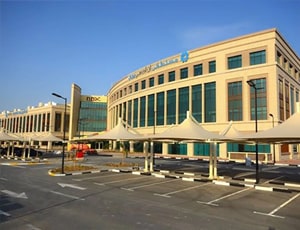
NMC Royal Hospital, Khalifa City located in Abu Dhabi, United Arab Emirates is accredited by JCI. Also listed below are some of the most prominent infrastructural details:

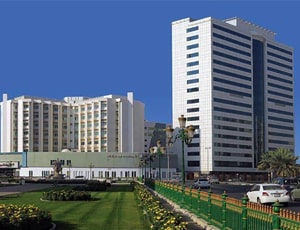
NMC Royal Hospital Sharjah located in Sharjah, United Arab Emirates is accredited by JCI. Also listed below are some of the most prominent infrastructural details:
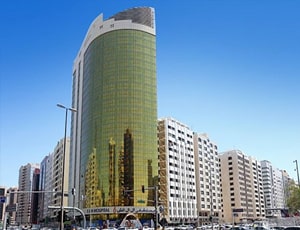
LLH Hospital, Abu Dhabi located in Abu Dhabi, United Arab Emirates is accredited by JCI. Also listed below are some of the most prominent infrastructural details:
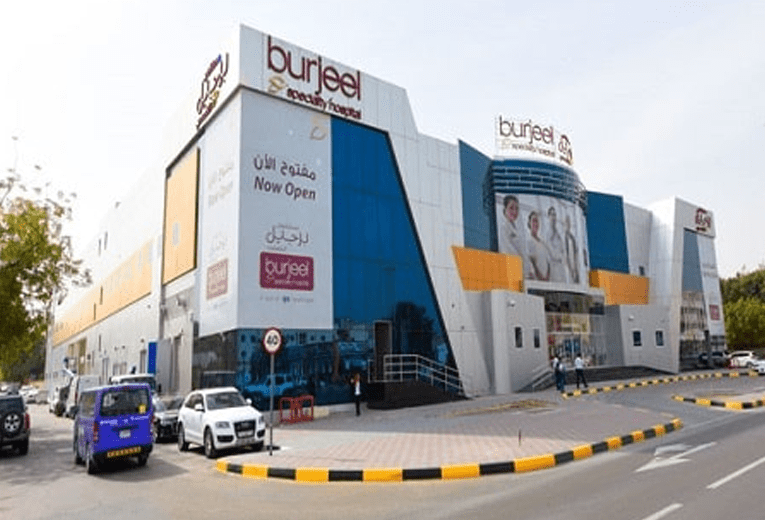
Burjeel Specialty Hospital is built on an area of 16,000 square meters. It is a 75-bedded hospital with 24-hours emergency services. It has a 24-hours Laboratory & a unique radiology department. Hospital tries to cover every need of patients and to help them in their need hour with all its available medical services.
The hospital constitutes many centers such as women’s health center, premium care surgery center, heart care center, Bariatric & weight loss clinic, and many others, in order to conduct proper medical care for the patients.
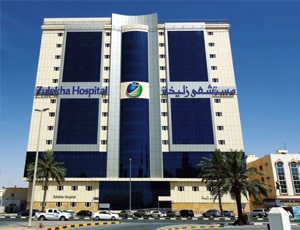
Zulekha Hospital Sharjah located in Sharjah, United Arab Emirates is accredited by ISO, JCI. Also listed below are some of the most prominent infrastructural details:
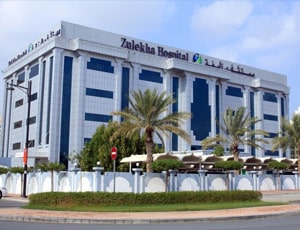
Zulekha Hospital Dubai located in Dubai, United Arab Emirates is accredited by ISO, JCI. Also listed below are some of the most prominent infrastructural details:
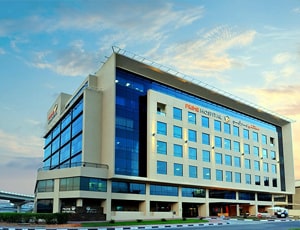
Prime Hospital located in Dubai, United Arab Emirates is accredited by ISO, JCI. Also listed below are some of the most prominent infrastructural details:
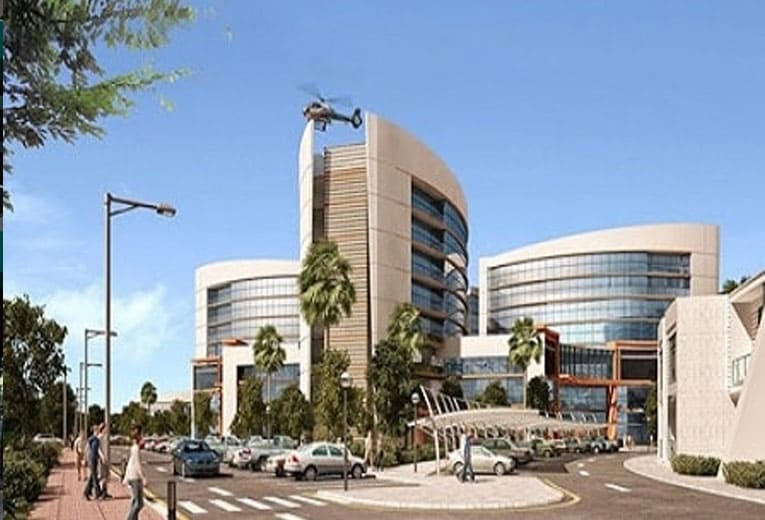
The Hospital owns an International Patient Services Team that is responsible to assist international patients with world-class healthcare, transportation arrangement, accommodation facilities, language interpreters, and much more.
Burjeel Medical City (about 1.2 million square facilities)provides 7-star hospitality to its patients. It has the largest facility space bed among all the private hospitals. The Hospital consists of-
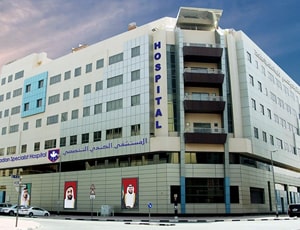
Canadian Specialist Hospital located in Dubai, United Arab Emirates is accredited by JCI. Also listed below are some of the most prominent infrastructural details:
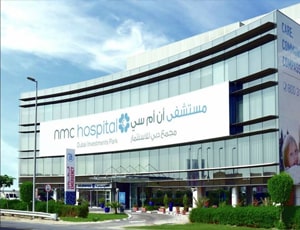
NMC Royal Hospital, DIP located in Dubai, United Arab Emirates is accredited by JCI. Also listed below are some of the most prominent infrastructural details:
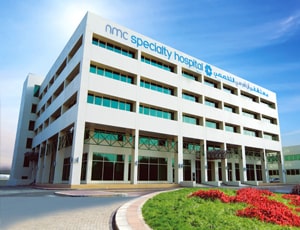
NMC Specialty Hospital - Al Ain located in Abu Dhabi, United Arab Emirates is accredited by JCI. Also listed below are some of the most prominent infrastructural details:
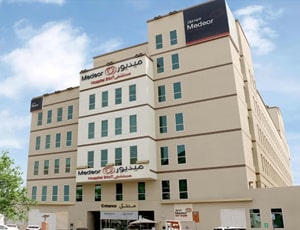
Medeor 24X7 Hospital located in Dubai, United Arab Emirates is accredited by JCI. Also listed below are some of the most prominent infrastructural details:

Medeor 24X7 International Hospital, Al Ain located in Abu Dhabi, United Arab Emirates is accredited by JCI. Also listed below are some of the most prominent infrastructural details:
Laryngectomy refers to the surgical procedure by which the larynx, commonly called
Laryngectomy is a serious, complex, and major surgery that requires careful monitoring and must be performed under the guidance of an experienced surgeon. This radical procedure is warranted in cases of patients suffering from:
During the laryngectomy procedure, the doctor may decide to remove entire larynx or just a part of it, depending on the extent of damage and the condition of the patient. The doctor may even decide to remove a part of the pharynx during the same procedure. A pharynx is a passage between the oesophagus and nasal cavity. The surgeon first makes a slit in the throat of the patient to expose the larynx and the surrounding tissues, which are then removed along with it. In some cancer cases, the surrounding lymph nodes are also removed.
This step is followed up with
Tracheoesophageal Puncture (TEP)
Tracheoesophageal puncture (TEP) is a special procedure, typically conducted along with laryngectomy. During this procedure, a hole is created in the oesophagus and the trachea. After the hole has healed, a prosthetic voice box is attached there so that the patient is able to speak again.
Laryngectomy is a radical procedure and it requires the patient to stay in the hospital at least for a few days after the procedure. The patient spends the initial two days after the surgery in an ICU, wherein all the vital parameters such as heart rate, breathing rate, and blood pressure are carefully monitored. The patient is unable to eat anything until the wound in the throat completely heals. The patient gets all the nutrition through a feeding tube. The neck may remain painful for many days and medications are given to manage pain and swelling.
The patients are advised to move around a bit to prevent blood clots from building up. In addition, special care is needed to prevent stoma from infection as potentially harmful viruses and bacteria can enter the body through this newly created opening in the throat. It takes a long time for the patient to adjust to the changes in their throat and neck after the removal of their voice box. In the absence of a TEP, the patients are advised to consult a counsellor who can help with non-verbal communication and oesophagal speech.
Just like any other surgery, a patient who undergoes laryngectomy is at an increased risk of suffering from
Ask your healthcare adviser for the best multiple options and choose the one that meets your expectations
The cost of Laryngectomy in the United Arab Emirates starts from $9500. There many JCI, TEMOS certified hospitals in the United Arab Emirates that offer Laryngectomy
Different hospitals have different pricing policy when it comes to the cost of Laryngectomy in the United Arab Emirates. Some of the best hospitals for Laryngectomy offer a comprehensive package that covers the end-to-end expenses related to investigations and treatment of the patient. The comprehensive Laryngectomy package cost includes the cost of investigations, surgery, medicines and consumables. There are many things that may increase the cost of Laryngectomy in the United Arab Emirates, including prolonged hospital stay and complications after the procedure.
There are several best hospitals for Laryngectomy in the United Arab Emirates. The top hospitals for Laryngectomy in the United Arab Emirates include the following:
After discharge from the hospital, the patient has to stay for another 21 days in the country for complete recovery. During this time, the patient undergoes medical tests and consultations. this is to ensure that the treatment was successful and the patient us safe to return.
Apart from the Laryngectomy cost, the patient may have to pay for additional daily expenses such as for guest house after discharge and meals. These charges starts from USD 50 per person.
The following are some of the best cities for Laryngectomy in the United Arab Emirates:
After Laryngectomy, the patient is supposed to stay for about 4 days in the hospital for recovery and monitoring. During the recovery, the patient is carefully monitored and control tests are performed to see that everything is okay. If required, physiotherapy sessions are also planned during recovery in hospital.
The average rating for Laryngectomy hospitals in the United Arab Emirates is 4.5. This rating is automatically calculated on the basis of several parameters such as the infrastructure of the hospital, quality of services, nursing support and other services.
There are more than 19 hospitals that offer Laryngectomy in the United Arab Emirates. Such hospitals have the required infrastructure and a dedicated unit where patients can be treated. Also, these hospitals follow the necessary guidelines as required by the medical associations for the treatment of Laryngectomy patients.
Some of the most sought after doctors for Laryngectomy in the United Arab Emirates are: